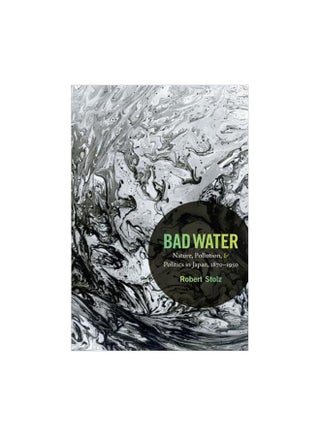| المراجعة التحريرية | Most helpfully, Stolz provides readers with a deeper understanding of the human nature connection. Nature is not merely understood and manipulated by human actions...rather, humans' relationship to nature arises from deeply held beliefs, theories and worldviews on a large scale. In other words, collective human theoretical understandings dictate the relationship to and with nature. -- Victoria Machado * Journal of Agricultural and Environmental Ethics * "This is a fascinating book for those who are interested in Environmentalism in other countries, especially Japan." -- Miller, Ryder W. * Electronic Green Journal * "Stolz's study has a relevance that goes far beyond its immediate time and place.... Bad Water is a very valuable contribution, not just to Japanese environmental history, but also to global debates on the present-day environmental impasse." -- Tessa Morris-Suzuki * Japanese Studies * "While Bad Water's close reading of the Ashio copper mine disaster and the origins of Japan's environmental movement will appeal to specialists in modern Japan, Stolz's sophisticated Marxian analysis of the subsumption of nature under capital is a significant contribution to environmental history that deserves a wide audience of environmental scholars." -- Tristan R. Grunow * Environmental History * "Robert Stolz's Bad Water is an impressive analysis of the history of the interaction between political and ecological thought in modern Japan.... This book is valuable to the study not only of Tanaka and of Japanese environmental problems but also of the history of ideas on the relationships among politics, society, the human body, and nature in a global context." -- Yuuki Tomozawa * East Asian Science, Technology and Society * "Stolz brings to his study fresh and important perspectives on familiar events, intellectual trends, and individuals as well as introducing heretofore little-known (but significant) thinkers and narratives to the Western scholarship." -- William M. Tsutsui * Pacific Affairs * "Stolz's book gains its special strength from its close intertwining of Marxist theory with the lives of the central protagonists... As this statement suggests, Bad Water successfully stitches together environmental history, a social ecology that predates that of Bookchin, and Marxist theory." -- Paul Waley * Journal of Interdisciplinary History * "A sound achievement in an area of modern Japanese thought too lightly regarded before now." -- Tom Havens * American Historical Review * "The author presents important material that is new to environmental history, to intellectual history as well as to studies of Japan. He shows that Japan has a long history of environmental disasters and gives some sense of why this has been so. His individual case studies (Tanaka, Ishikawa and Kurosawa) are well selected. And his conclusions about the limitations of liberal democracy and of liberalism in any form are illuminating, thoughtful accurate and sobering. Nature does not care whether politicians or a majority of the population they lead recognize the greater frequency of extreme weather-including global warming-or not. These things are happening and surely require a far stronger response than any counter-measures that have been proffered up to now."- -- James Bartholomew * Times Literary Supplement * |
استرجاع مجاني وسهل
أفضل العروض

